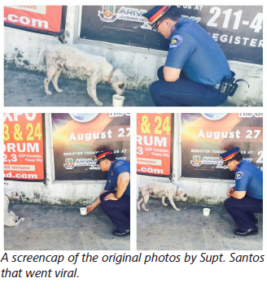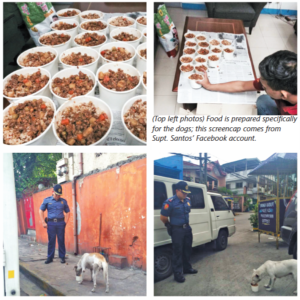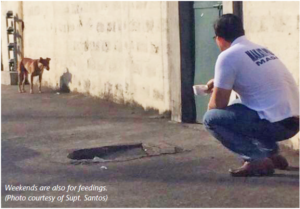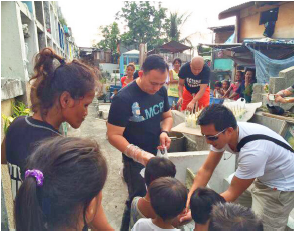This police officer feeds the stray dogs in his area.
Photos courtesy of Supt. Jaime Santos’ social media.
To Serve and to Protect”, the motto of the Philippine National Police, does not explicitly state to whom they render this vow. Perhaps it has always been assumed to be limited to fellow humans, especially of late, because it is more commonly the undertaking of everyday citizens and, later, animal welfare organizations, to be concerned with the care and protection of animals.
As such, it usually comes as a surprise to pet owners, when they seek assistance for violations to the Animal Welfare Act (RA 8485/RA 10631), that they are instructed to call on Patrol 117 to start the appropriate legal process and action for their complaints.

Breaking the Boundary
This is the odd line broken by Supt. Jaime Santos, Deputy Chief of Police for Administration, of the Makati Police Station. A photograph he posted on his Facebook account on 2 February 2016 of himself feeding a stray dog quickly went viral, garnering salutes from friends and strangers as well as prayers that he may be further blessed for his kindness.
His post, translated, says: “My daily routine includes feeding poor dogs, especially after my patrol and inspection of fellow police. Why do I do this? It’s a different feeling when you can help, even if it’s just one meal for a sick dog no one cares for and who gets treated like trash by other humans. I arrange my schedule to find time to do this. Even if the dog can’t say a word of thanks, I know and I can feel the gratitude from them.”
An Act of Love
His empathy for animals in need began at a young age, as he grew up with pet dogs in the family. This empathy came to a peak when he was nine and witnessed an act of cruelty. In Filipino, he narrated how the dog was crying as it bled from the blows it was receiving from some person—and yet, it was trying to cuddle up to its tormentor. The young Santos grabbed a piece of wood and, crying, he approached the abuser and asked the person to stop, or else he would deal the same punishment to that person. Since then, he added, he has loved animals.

A common (and maliciously false) accusation all people involved in animal welfare is that they don’t care about human beings. But Santos began a feeding program with his wife in 2000, when they would visit an orphanage in Sta. Mesa, bringing milk and diapers for the babies and buying food for the older children.
He smiles as he narrates how having beef brisket rice porridge cooked made the program more popular. Santos and his wife gave food to those who’d been victims of storms, fires, and to those in shanty areas. Around 2007, he noticed that once the feeding sessions were over, about half a dozen dogs or so would linger,hoping for scraps. And so his feeding program expanded to include dogs.
Weekends find him and his family anywhere in Makati, Manila, Quezon City, and on occasion, various locations in Regions 3, 4, and 5. Their most recent feeding program for both humans and dogs were in the Pasay Cemetery and Manila South Cemetery. After distributing food to the people in the area, they would call on the dogs waiting nearby, distributing as many as twenty-five containers of food for the animals.
Those containers did not have mere leftovers; Santos explains that he commissioned a friend with a carinderia to cook ground pork for the dogs, as he wasn’t sure they were used to store-bought dog food. He buys and uses containers to portion off the food and ensure more dogs can get a share.

Using this homemade mix, he feeds stray animals in various areas on a daily basis, beginning with those outside the station. Everyday, as early as 5 AM, Santos goes in to work so that he can get his work done and have more time for feeding the animals that need his help. He doesn’t hesitate to look for dogs hiding under cars or who are scrounging in the trash. He even carries extra containers of prepared food for any strays that might cross his path while he is on duty.
“Aspin Patrol”
On his weekday rounds within various areas of Makati, he is typically in uniform, helping people identify him as a police officer and not an animal catcher. On weekends, he is less conspicuous while making the rounds in other parts of the metro with his daughter, Tiara. Neither make any effort to introduce themselves, focusing solely on their task of feeding the animals. He’s playfully dubbed his operations the “ASPIN Patrol.”
Usually, the reaction of people in the area to their surprise visits is positive; they are delighted to see the Santoses and he shares how some have even wept openly to see them helping neglected dogs. In addition, others are touched to see a policeman—unfortunately associated with corruption and greed—like him rendering assistance to helpless creatures. They’ve told him that they thought people like him only existed in the movies.
His kindness helps people overcome their fears and hesitation; Santos talks about how people sometimes hide their dogs, thinking he’s from the pound—then when they discover what he does, they bring out the dogs again and thank him profusely. Sometimes they even ask if he can feed people as well on his regular rounds.

But what Santos does isn’t always easy or safe, he admits; he acknowledges that he risks being bitten by traumatized strays. Sometimes a dog will bark at him for a long time before finally coming up to him and letting him feed it.
And despite the obvious concern he shows for the animals they own, advice offered by a stranger in civilian clothing can be met with some hostility, especially when he tries to give suggestions on veterinary care. Few actually listen to him, and even then, his advice is met with some hesitation.
The family presses on with their ASPIN Patrol anyway, preparing and packing food that they can distribute to humans and dogs alike. And incredibly, he’s planning to expand his feeding program yet again, this time to include cats because, as he says ruefully, there are many of them that are also starving.

Giving Thanks
The most remarkable thing about his and his family’s efforts is the fact that it is all purely from their own initiative. Santos shares that he feels it’s his responsibility, and that all funding comes from his pocket, although sometimes, people will donate to his cause.
Asked why he carries out a task that earns him little thanks from humans, Santos says he wants to show people that you don’t need to be rich to feed others. He considers what he does his way of giving back to God, from whom he says all blessings flow.
This appeared as “To Serve and Protect All Life” in Animal Scene’s March 2016 issue.




